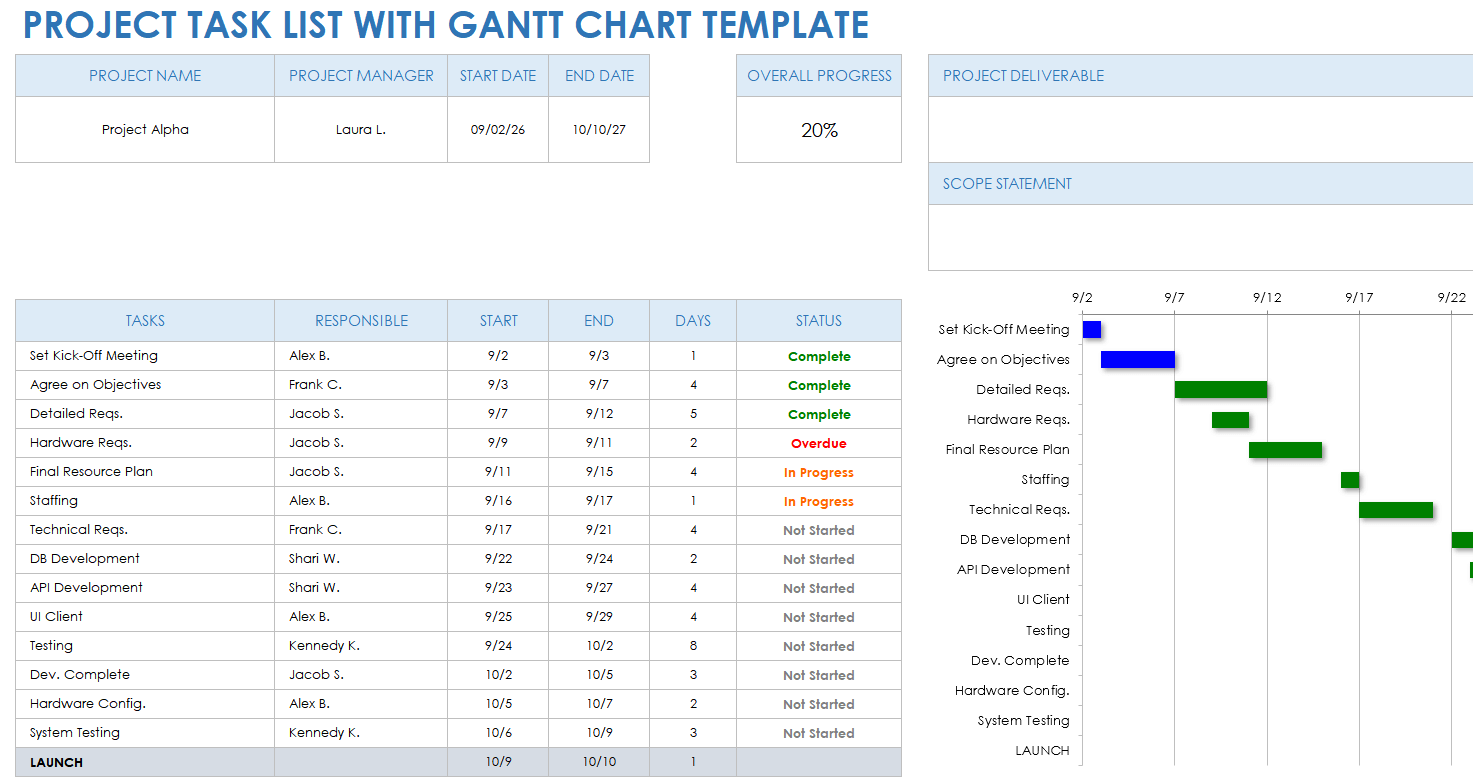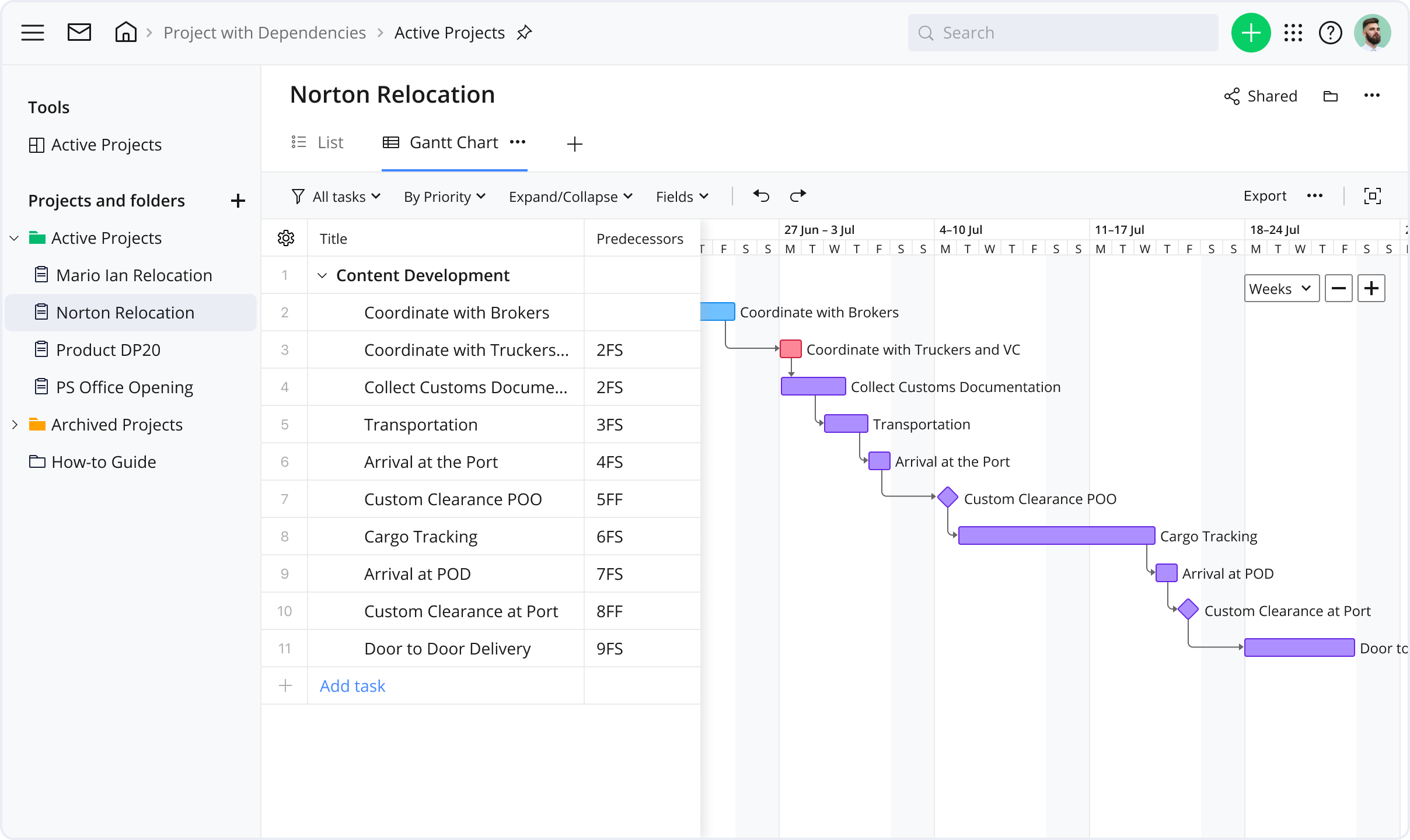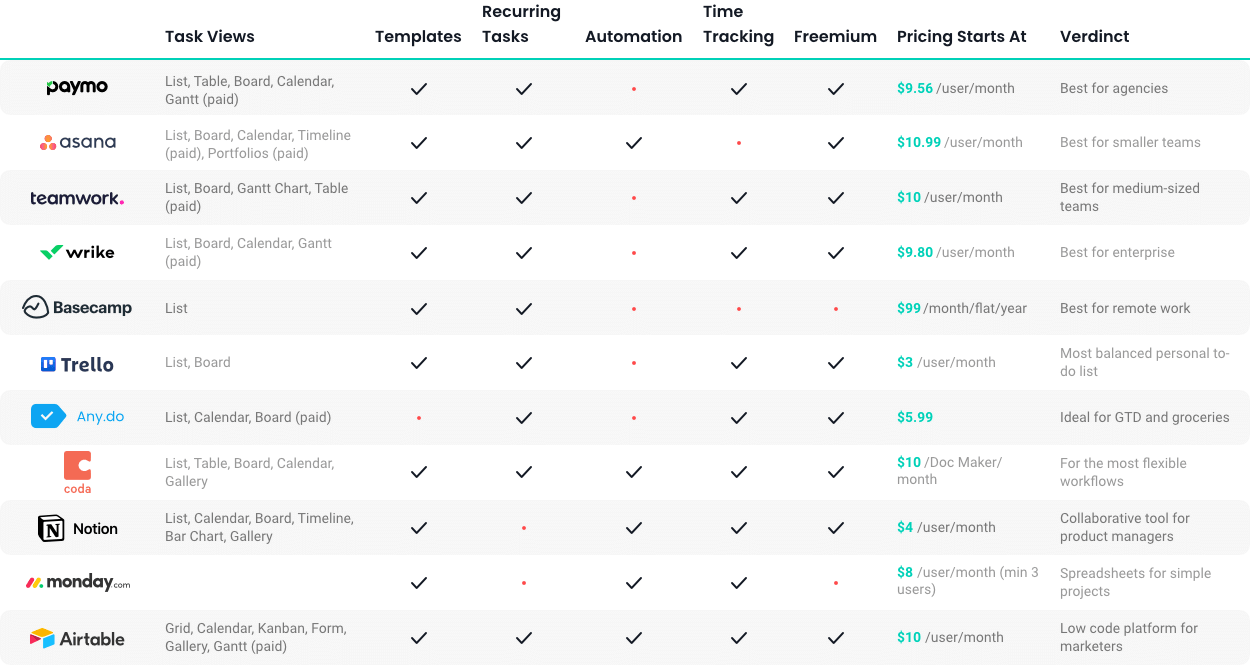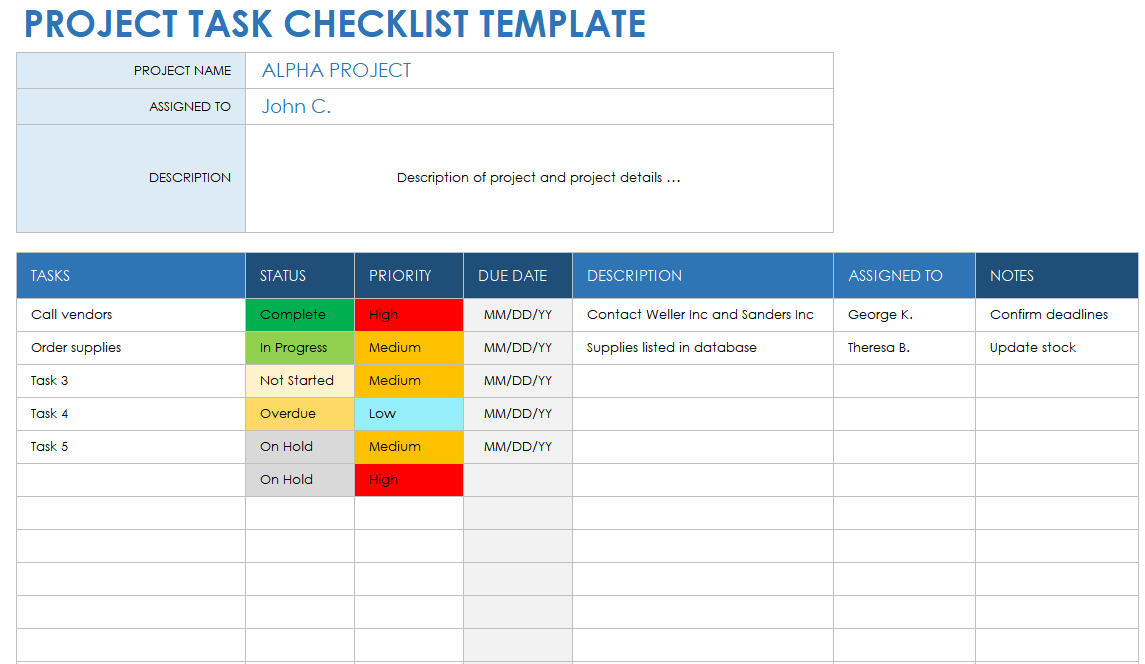In the fast-paced world of coding, keeping track of tasks and managing projects efficiently is crucial. The article “Task Management in Coding: Project Planning and Efficient To-Do Lists” delves into the importance of proper task management in coding projects. Whether you’re a novice coder or an experienced developer, effective project planning and creating efficient to-do lists can significantly enhance your productivity and ensure timely completion of tasks. By following these strategies, you’ll be able to stay organized, prioritize tasks, and achieve your coding goals with ease.

This image is property of www.smartsheet.com.
The Importance of Task Management in Coding
As a coder, efficient task management plays a crucial role in your productivity and overall success. By effectively managing your tasks, you can improve your productivity, enhance organization and time management, and reduce errors while increasing code quality.
Improved productivity and efficiency
One of the key benefits of task management in coding is improved productivity and efficiency. By breaking down complex projects into smaller tasks, you can focus on one task at a time, reducing the overwhelm and increasing your ability to complete tasks in a timely manner. Task management helps you prioritize your work, ensuring that important and urgent tasks are completed first, while less critical ones can be tackled later.
Better organization and time management
Task management in coding also improves organization and time management skills. By defining the scope and objectives of your projects, you can create a roadmap that outlines the tasks needed to achieve your goals. Breaking down these tasks into smaller subtasks and creating milestones allows you to track progress and ensures that you stay on schedule. Additionally, setting realistic deadlines and timeframes helps you allocate your time effectively, preventing procrastination and helping you stay focused.
Reduced errors and increased code quality
Another significant advantage of effective task management in coding is the reduction of errors and the improvement of code quality. By including all necessary details and requirements in your task descriptions, you ensure that nothing is missed. This helps prevent misunderstandings and minimizes the risk of introducing bugs or errors into your code. Task management tools and software can also play a vital role in ensuring code quality by providing features such as code reviews, version control systems, and integrated development environments (IDEs) with built-in task management capabilities.
Project Planning in Coding
Before diving into coding, proper project planning is essential. This phase involves defining the project scope and objectives, breaking down tasks, estimating time, allocating resources, and identifying potential risks and dependencies.
Defining project scope and objectives
When starting a coding project, it’s crucial to have a clear understanding of what needs to be achieved. Defining the project scope helps you outline the boundaries and deliverables of the project. It also lays the foundation for setting realistic objectives that align with the stakeholders’ expectations.
Breaking down tasks and creating milestones
Breaking down complex projects into manageable tasks is an effective way to approach coding projects. By dividing the work into smaller subtasks, you can focus on one specific task at a time, which enhances productivity and reduces the risk of errors. Creating milestones allows you to track progress and ensures that you’re moving towards the project’s completion.
Estimating time and allocating resources
Accurate time estimation and resource allocation are essential for successful project planning. By estimating how long each task will take, you can allocate resources effectively and plan your project timeline accordingly. This helps prevent unexpected delays and allows you to manage your workload more efficiently.
Identifying dependencies and potential risks
Identifying dependencies and potential risks early in the project planning phase is crucial for successful task management. By understanding which tasks are dependent on others, you can prioritize and schedule them accordingly. Additionally, identifying potential risks enables you to develop contingency plans and proactively manage any challenges that may arise during the coding process.

This image is property of clickup.com.
Effective To-Do Lists in Coding
To-do lists are invaluable tools for managing tasks and staying organized in coding projects. When creating an effective to-do list, consider the following strategies:
Prioritizing tasks based on importance and urgency
When creating a to-do list, it’s essential to prioritize tasks based on their importance and urgency. This allows you to focus on tasks that have a higher impact on the project’s success or have impending deadlines. By tackling high-priority tasks first, you can ensure that critical work is completed on time.
Breaking down complex tasks into smaller subtasks
Complex tasks can be overwhelming and difficult to tackle all at once. Breaking them down into smaller, more manageable subtasks makes them easier to approach. This approach allows you to make progress incrementally, which boosts motivation and avoids feelings of being stuck.
Setting realistic deadlines and timeframes
When adding tasks to your to-do list, be mindful of setting realistic deadlines and timeframes. Consider the complexity and estimated time needed for each task, allowing for unforeseen challenges or setbacks. Setting achievable deadlines helps you manage your workload effectively and reduces the risk of feeling overwhelmed.
Including all necessary details and requirements
To ensure that you complete tasks accurately, it’s important to include all relevant details and requirements in your to-do list. This allows you to have a clear understanding of what needs to be done and minimizes the risk of misunderstanding or missing crucial information.
Using task management tools and software
Utilizing task management tools and software can greatly enhance your to-do list effectiveness. Tools like Jira, Trello, Asana, and Todoist provide features like task tracking, collaboration, and deadline reminders. These tools help streamline your task management process, improve organization, and facilitate communication between team members.
Choosing the Right Task Management Methodology
When it comes to task management in coding, different methodologies offer various approaches to project planning and execution. The choice of methodology depends on the project’s requirements and the preferences of the development team. Here are some widely-used methodologies in the coding industry:
Waterfall methodology
The waterfall methodology follows a linear and sequential approach to project management. It involves completing each phase of the project before moving on to the next one. This methodology is suitable for projects with well-defined requirements and a clear understanding of the final product.
Agile methodology
The agile methodology focuses on iterative and incremental development. It emphasizes adaptability, collaboration, and customer feedback. Rather than completing all tasks in one go, agile projects are divided into short iterations called sprints, allowing for flexibility and continuous improvement.
Kanban methodology
Kanban is a visual task management methodology that enables teams to visualize and track their tasks using boards and cards. It emphasizes limiting work in progress, promoting flow, and highlighting bottlenecks. Teams using Kanban continuously pull tasks from a backlog into the “in-progress” and “completed” columns.
Scrum methodology
Scrum is an agile framework that emphasizes teamwork, collaboration, and frequent communication. It divides the project into shorter time periods called sprints, during which the team works on a set of tasks. Daily scrum meetings are held to discuss progress, address challenges, and plan the work for the day.

This image is property of web-static.wrike.com.
Best Practices for Task Management in Coding
To ensure effective task management in coding, consider incorporating the following best practices into your workflow:
Clear communication and collaboration
Clear and effective communication is vital for successful task management. Share project updates, discuss challenges, and ensure everyone understands their assigned tasks. Collaborate with team members and encourage open lines of communication to foster a positive and productive working environment.
Regular progress tracking and updates
Regularly track your progress and provide updates to the project team. This helps maintain transparency and accountability. Document task progress, flag any roadblocks or dependencies, and update stakeholders on the project’s status. Regular progress tracking allows for early identification of issues and ensures project milestones are achieved.
Avoiding multitasking and focusing on one task at a time
Multitasking can be detrimental to task management in coding. Instead of switching between multiple tasks simultaneously, focus on one task at a time. Devote your full attention to each task, ensuring that it is completed accurately and efficiently before moving on to the next one.
Regularly reviewing and adjusting task priorities
Task priorities can change throughout the course of a project. Regularly review and adjust task priorities based on changing requirements or emerging dependencies. By staying flexible and adaptable, you can effectively manage shifting priorities and ensure that high-priority tasks are always addressed promptly.
Creating a conducive work environment
A conducive work environment greatly impacts task management. Eliminate distractions, organize your workspace, and establish a routine that helps you maintain focus and productivity. Minimizing interruptions and creating a comfortable work environment can significantly enhance your task management abilities.
Task Management Tools for Coders
There are numerous task management tools available that can assist coders in organizing their work and staying on track. Here are some popular tools used by coding professionals:
Project management software (e.g., Jira, Trello)
Project management software like Jira and Trello offers comprehensive task management features, including task tracking, assigning tasks to team members, setting deadlines, and generating progress reports. These tools provide a centralized platform for collaboration and ensure transparency throughout the development process.
Task tracking tools (e.g., Asana, Todoist)
Task tracking tools like Asana and Todoist help you create to-do lists, set deadlines, and track progress on individual tasks. These tools often integrate with other project management software and provide reminders, notifications, and task completion status updates.
Version control systems (e.g., Git, SVN)
Version control systems such as Git and SVN are critical for tracking code changes and managing collaborative coding projects. These tools allow coders to work on different aspects of a project simultaneously, keep track of code versions, and merge changes seamlessly.
Integrated development environments (IDEs) with built-in task management features
Many IDEs, such as Visual Studio Code and JetBrains IntelliJ IDEA, offer built-in task management features. These features allow you to create to-do lists, add comments or annotations to specific lines of code, and track progress directly within the development environment. By combining coding and task management capabilities, these IDEs streamline your workflow and improve productivity.

This image is property of cfw.paymoapp.com.
Common Challenges in Task Management for Coders
Task management in coding comes with its own set of challenges. Understanding and addressing these challenges is crucial for successful project execution. Here are some common challenges coders may encounter:
Changing project requirements
Projects often undergo changes in requirements, which can impact task management. Being prepared to adapt to these changes and adjusting task priorities and timelines accordingly is essential to ensure project success.
Unforeseen technical issues or bugs
Technical challenges and unexpected bugs are part of the coding process. Dealing with these issues can disrupt task management and require time and effort to overcome. Effective troubleshooting and problem-solving skills are key to managing these challenges.
Lack of clear communication
Poor communication can lead to misunderstandings, missed deadlines, and incomplete tasks. It is important to establish clear lines of communication within the project team and ensure that everyone has a thorough understanding of their assigned tasks and responsibilities.
Unrealistic deadlines and time constraints
Setting unrealistic deadlines or working under tight time constraints can negatively impact task management. It is important to set realistic timelines and manage expectations to avoid compromising quality or overburdening team members.
Coping with distractions and interruptions
Coders often face distractions and interruptions that can disrupt their workflow and task management. Establishing strategies to minimize distractions and create a focused working environment is crucial for efficient task management.
Improving Task Management Skills in Coding
To continuously improve your task management skills and increase your coding efficiency, consider the following strategies:
Learning time management techniques
Investing time in learning time management techniques can significantly improve your task management abilities. Techniques such as prioritization, goal setting, and effective scheduling can help you make the most of your available time and ensure that tasks are completed on schedule.
Prioritizing and delegating tasks effectively
Prioritizing tasks and recognizing when to delegate tasks to other team members can optimize your workflow. Focus on high-priority and high-impact tasks, and if possible, delegate less critical tasks to others. This allows you to concentrate on tasks that demand your expertise and attention.
Enhancing communication and collaboration skills
Effective communication and collaboration skills are essential for successful task management in coding. Continue to develop your communication skills, actively engage in team discussions, and actively listen to others. Foster a collaborative environment where team members feel comfortable sharing ideas and raising concerns.
Adopting agile and iterative approaches
Agile methodologies, such as Scrum or Kanban, emphasize iterative development and continuous improvement. Embracing agile principles can enhance your task management skills by allowing you to adapt to changes, leverage customer feedback, and iteratively refine your work.
Continuously learning and improving coding skills
Task management in coding goes hand in hand with continuous learning and skill development. Stay updated with the latest coding trends, technologies, and best practices. Engage in coding communities, join forums, and take online courses to enhance your coding skills and remain competitive in the industry.

This image is property of www.smartsheet.com.
Case Studies: Successful Task Management in Coding
Examining successful task management implementations can provide valuable insights and inspiration. Here are three case studies showcasing successful task management in coding:
Project X: How efficient task management led to on-time delivery
Project X was a complex coding project with a tight deadline. By implementing effective task management strategies, the team broke down the project into manageable tasks, prioritized them based on importance and urgency, and utilized task management software to track progress. Regular communication and collaboration ensured that any challenges were addressed promptly. The result was an on-time delivery of the project with high code quality and client satisfaction.
Project Y: Overcoming challenges through effective task tracking
Project Y faced multiple challenges throughout the coding process, including shifting requirements and technical issues. However, the team’s effective task tracking methods allowed them to identify and address these challenges promptly. Regular updates and progress tracking helped the team stay on top of their tasks, ensuring that deadlines were met and any issues were resolved efficiently.
Project Z: Collaboration and communication success story
Project Z involved a geographically dispersed team with different time zones and cultures. Despite these challenges, the team successfully managed their tasks through clear communication and collaboration strategies. By leveraging task management tools and establishing regular communication channels, the team overcame barriers and delivered the project with exceptional efficiency and quality.
Conclusion
Effective task management is essential for success in coding projects. By implementing task management strategies, such as proper project planning, efficient to-do lists, and choosing the right methodology, you can increase your productivity, reduce errors, and improve the overall quality of your code. Emphasizing best practices, utilizing task management tools, and continuously improving your skills will help you navigate common challenges and achieve successful outcomes. Task management is not just a means to an end, but a continuous process of learning and adapting to ensure coding success.
